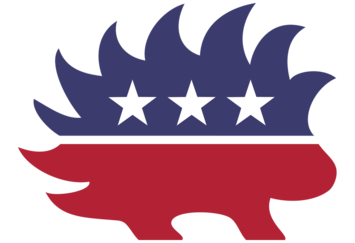
In the era of Ronald Reagan and Margaret Thatcher, libertarian ideas about de-regulation and personal liberty were ascendant. Even if they had little direct power, the free market ideologues had access to the highest levels of government and business.
Today the libertarians are increasingly the odd man out. As Donald Trump rightly pointed out at their recent convention, to a chorus of boos, the libertarians have become a fringe group with little chance of influencing anyone. When he claimed they would be the party of “three or four per cent” of the vote, he was overestimating their influence. In 2020, the Libertarian candidate received a rollicking 1.2 per cent of the vote, less than half their paltry 2016 performance.
This year, in which the electorate is restless and disgusted with their main awful party choices, the libertarians are playing a very small role. They are likely to be overwhelmed not only by the candidacy of Independent Robert Kennedy Jr., who was disdained at the convention despite making a strong case against the censorship regimes of President Joe Biden and Prime Minister Justin Trudeau. They may not also beat pro-Hamas candidates Cornel West and Jill Stein.
Consider their choice of presidential candidate, Chase Oliver, a far from well-known 38-year-old party activist who favours drug decriminalization and opposes gun restrictions, as well as military assistance to either Israel or Ukraine. Hard to see much of a groundswell for this mélange of positions. In Canada, the Libertarians are even more a small fringe group which one prominent, sympathetic conservative suggested was “in the wilderness with the Communist Party and a handful of other parties.“
Of course, the formal Libertarian Party has never been as important as the ideas generated by libertarians. But if the ideology has remained the same, economic conditions have changed dramatically. In the era between Ronald Reagan and Bill Clinton, Americans — like the British liberals of the 19th century — favoured free trade because they dominated the world economy. But today, the rise of mercantilist China has created a new superpower that sees free trade as a matter of strictly protecting its own markets while entering those of the United States unhindered.
Read the rest of this piece at National Post.
Joel Kotkin is the author of The Coming of Neo-Feudalism: A Warning to the Global Middle Class. He is the Roger Hobbs Presidential Fellow in Urban Futures at Chapman University and and directs the Center for Demographics and Policy there. Learn more at joelkotkin.com and follow him on Twitter @joelkotkin.
Photo: the 'Libertarian Porcupine", a popular mascot for the Libertarian Party. Lance Havercamp via Wikimedia CC 1.0 License.












